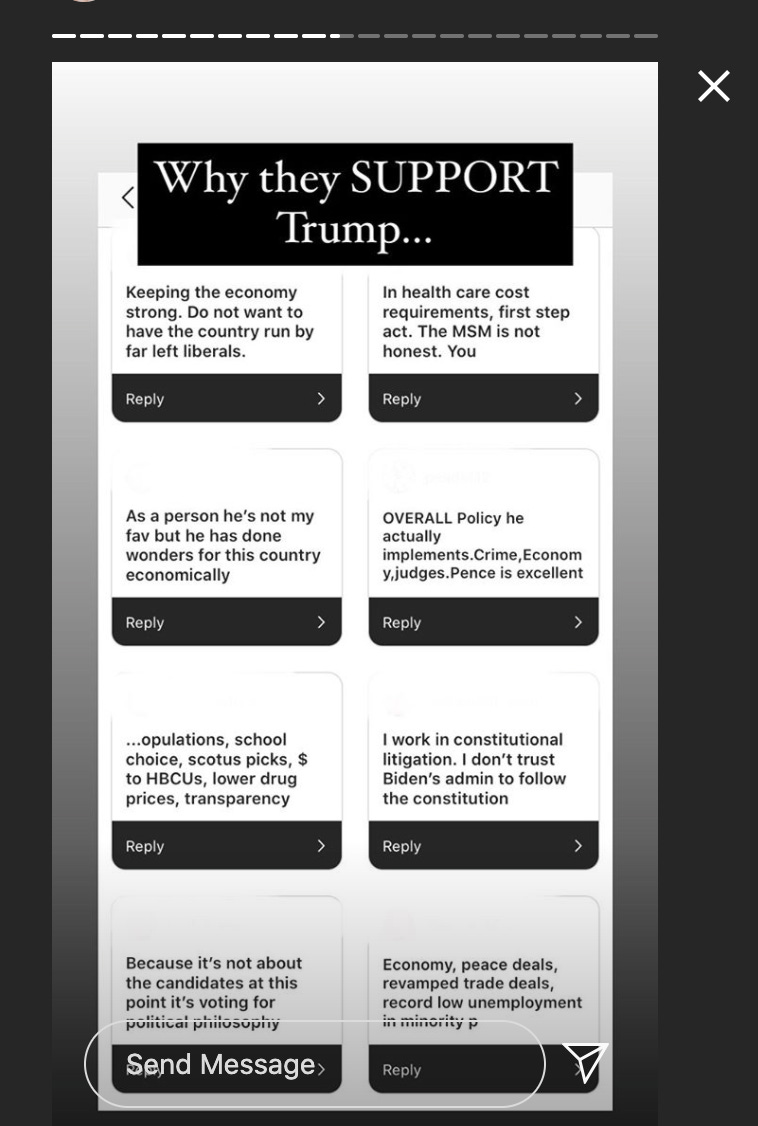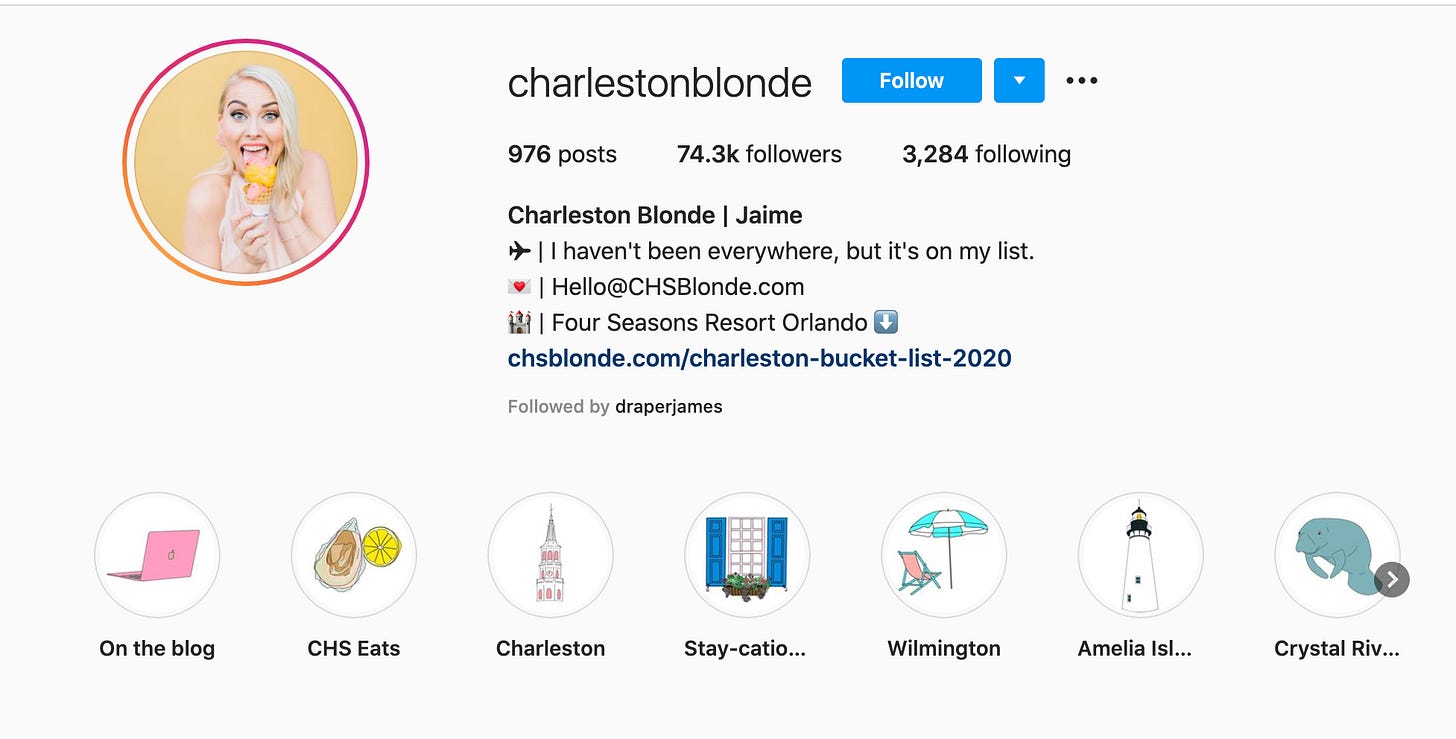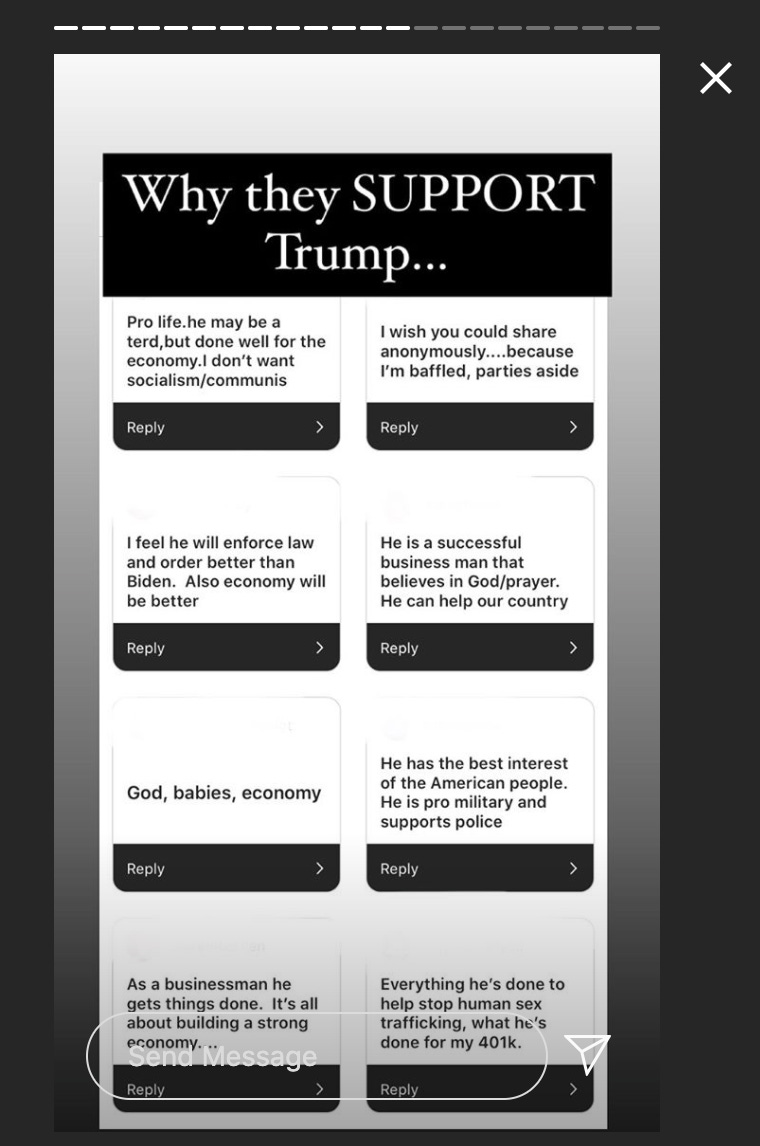
Following the debate, the popular lifestyle blogger Charleston Blonde posted a simple poll in her Instagram stories. “Who are you voting for?” she asked, with options to click Trump or Biden. At first, the votes were split evenly: 116 to 116, 141 to 141. She asked another question, with the guarantee that she would post replies anonymously. “If voting for Trump, tell me why,” followed by “If voting for Biden, tell me why.”
The responses flowed in overnight, as Trump took the lead in the original poll (the last tally posted: 1172 for Trump to 924 for Biden). She started posting collections of responses, like the one I screenshotted above. The recurring themes: abortion, faith, law and order, but mostly the economy, with a small twist of QAnon “Save the Children.” (“Everything he’s done to help stop human sex trafficking,” one person wrote, “What he’s done for my 401k.”)
Some of this is not surprising: conservative voters care about conservative issues, like abortion, and the longstanding talking point of “law and order,” which has become a way to be anti-BLM while evading a discussion of racial justice. But the one that sticks out to me, and that so many pundits and Democrats still struggle to understand and/or communicate, is that a lot of these women are just middle class, lifestyle-blog reading bougie women who want to maintain their current lifestyle.

This Lifestyle Blog Trump Voter undercuts the longstanding image of the Trump supporter as working class, with all the attendant signifiers. This Trump Voter watches Fox News, didn’t go to college, likes football and God, hunts or fishes, own guns and flags, listens to country music and lives in a rural place. I grew up in a small town in North Idaho, and a lot of the people I grew up with fit some of this description, albeit in far less cartoonish ways than the media often imagines. But most of those people, at least the ones still on Facebook, aren’t “working class.”
Their parents might have worked in the paper mill or at the bullet factory, but they don’t. They’re teachers, dietitians, nurses, developers, small business owners, construction foremen, engineers, dentists, paralegals, and cars salesmen. Some still live in the area, others have left for similar ones. Almost all of them went to college in some form, usually one of the local state schools. Some of them went to my church growing up, or one like it, and periodically post about God or Jesus guiding them, but few, save the Mormons and a few of the Catholics, are actively involved in church communities.
The women post and aspire to different iterations of the Charleston Blonde lifestyle: there’s a lot of beautiful family photos on the banks of our local river, taken by a photographer from one of the studios responsible for so many of our “senior photos” when we were in high school. There are frequent posts for milestones, complete with those little felt message boards: first day of school, of course, but also first dance, first t-ball game, first dance recital. Most own their homes — North Idaho is still a pretty affordable place to buy or build a home — and most are married and have two income streams. They are almost all white.
A few surprised me this summer by showing up (and posting pictures from) to a sizable Black Lives Matter rally in June. But most avoid “politics,” at least in the public social media forums where I encounter them. That’s part of the reason so many have gravitated to Instagram, which provides the illusion of a depoliticized, aesthetics-focused space. Are they voting for Trump? I know some who did. A few others, including some who I was not necessarily close with back then, but email back and forth with today, consider themselves conservatives, but find Trump morally repugnant. Others might not vote at all.
These are the people who get lost when the media focuses on the stereotype of the Fox News-addled backwoods Trump voter. There are so many well to do suburban and small town women — mostly, but certainly not entirely, white — for whom all the ideological stuff, all the character issues, all the racism and white supremacist baiting, all the stuff so many people find morally repugnant, it just doesn’t figure. Part of that is because their class (and, often, race) means that it just doesn’t have to. But part of it has to do with an eagle-eyed focus on their own financial future. Other concerns, no matter how morally pertinent, fall to the side.
Yes, they want to maintain their lifestyle — it’s just not the “working class” lifestyle so many people map onto them. It’s a lifestyle of curation and cuteness to the point of sameness, of Chip and Joanna Gaines style room makeovers and Home Edit organization. I don’t mean to degrade any of those things — I have fucking shiplap on my walls and my grains are in Mason jars — so much highlight how aspirationally bourgeois they are. This Trump Lifestyle voter doesn’t think Trump Tower is actually classy. They think, as I pointed out almost exactly four years ago, that Ivanka is.
Some of the responses to Charleston Blonde’s query evoked specific economic gains: the health of one woman’s 401k, for example. But others just said “the economy.” It’s worth pointing out that for many white families, the COVID-inspired recession is largely over: 61% of white women have recovered jobs they’ve lost, compared to 34% of Black women. Some families might be grappling with losing an income stream, but at least amongst my Idaho classmates, most of their middle class work, in everything from car sales to health care, is steady. They don’t pay attention to Trump’s tweets. They don’t revel in his debate style because it’s what their working class homes, growing up, felt like — as one pundit ridiculously suggested this morning, in a tweet that’s since been deleted. They just want more of the status quo for them and theirs.

Which helps explain answers like the one in the far left corner of the screenshot above: “he may be a terd, but done well for the economy…I don’t want socialism/communism.” These women aren’t anti-Communist because of some weird holdover from the Cold War. They’re anti-Communist because they don’t want other people to have more money if it means that they will have less of it. When people talk about Trump supporters voting against their own interests, they’re eliding this very basic motivation: people voting entirely in their own interest.
To me, that rationale signals just how quietly unstable many of these voters actually find themselves. Even in a place like Idaho, with relatively cheap cost of living, there’s still a feeling — particularly amongst millennials, the sort of people who make up the primary readership for a blog like Charleston Blonde’s — that the bottom could fall out at any moment. A business could go under, a child could be diagnosed with a chronic illness, a parent could need full-time care and has no savings to cover it. The safety net is gone and the demands of middle-class living, from those family photos to constantly tweaking the design of your kitchen, add up. A lot of families are carrying two car loans, plus thinking about a third when their kid reaches high school age. Being middle class in America today requires a whole lot of consumer debt. The house of carefully balanced credit cards could collapse at any point.
That sort of conditioning to instability leads to all sorts of decisions. Some people look outward, for a way to change the society that has fostered that precarity. And some respond by looking inward, frantically trying to maintain what they’ve carved out for themselves. That turn inward is often facilitated by overtly and covertly racist ideas about poverty, addiction, crime, prison, education, and so much more. But the animating principle: self-preservation. Of class position, of course, but also placement in the racial hierarchy, dominance of religious beliefs, and general worldview. They want to maintain the status quo because, at least in this moment, it continues to favor them.
Until we can be honest about the actual characteristics of Trump voters, we’re going to keep having these dead-end conversations about this election. Many of the POC pundits and thinkers in my feed have been issuing this corrective for years, repeatedly pulling out the stats on suburban white women who voted for Trump, especially when white #Resist twitter starts talking about how black voters in particular need to show up on election day. But you know who keeps propping up this image of the working class Trump voter? A bunch of white, educated, upper middle-class people who should know better.
When you believe in the cartoon of the Trump base, it’s all the easier to distance yourself from them. A lot of people I know think they don’t actually know a single Trump voter. If they’re middle or upper class, and their extended circle is almost all middle or upper class, they’re almost certainly wrong.
For white liberals, this attitude allows a convenient othering and disavowal. A refusal to see the actual characteristics of the Trump coalition is a refusal to recognize just how many characteristics many of us share with them — and how readily NIMBYism, “nice white parenting” practices, and the desire to pay a little less in taxes could shift, with age and time, into something very much like a Trump vote.
Resisting that slide under capitalism takes continuous work. It takes widening the aperture of your world outside your own walls, even when your foundation feels unstable. It means resisting the American cult of the individual over and over again. It requires caring about other people, even and especially people who aren’t like you. It means being honest about ourselves and blind spots and laboring to correct them.
I can advocate and vote for policies that will provide more stability to everyone, including these Trump voting women — but I don’t know if I can personally change any of their minds. What I can do is continue the daily work of not becoming one of them. ●
As always, if you know someone who’d enjoy this sort of thing in their inbox, please forward it their way. If you’re able, think about going to the paid version of the newsletter — one of the perks are weirdly fun/interesting/generative discussion thread, just for subscribers, every week, which is thus far still one of the good places on the internet. If you are a contingent worker or un- or under-employed, just email and I’ll give you a free subscription, no questions asked. If you’d like to underwrite one of those subscriptions, you can donate one here.
You can find a shareable version online here. You can follow me on Twitter here, and Instagram here. Feel free to comment below — and you can always reach me at annehelenpetersen@gmail.com.





I've started following housing/development politics over the last few years and have come to believe that NIMBYism is the most powerful political force in the country. And although I don't disagree with any of the great points in this newsletter, it is a very, very bipartisan problem. Some of the most ardent Biden voters in the country, with Sierra Club memberships and "Refugees are Welcome Here" yard signs, will wage years-long scorched-earth campaigns against increased density in their neighborhoods - or even increased transit options that threaten their street parking spaces. Getting more acquainted with this mindset has made me pessimistic about the long-term future of policies to address climate change, especially, because it will require tangible changes to this class's lifestyle. I don't think we really have a political language of "consume less" (land, plastic, oil, etc) that applies to individuals, on either the left or the right, but we're going to need one.
This reminds me of the book “Driving After Class” which gets into white middle class precarity/anxiety and how all consuming it can be to “keep up” — it reflects both what you’re saying about how easy it is to lose financial security, and all the ways possessive investment in whiteness pops up in mundane choices. (Also, as an *almost finished* anth phd at UT I love reading your cultural analysis. It’s resonant with my work and aspirational!)